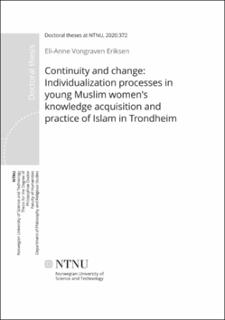| dc.contributor.advisor | Mårtensson, Ulrika | |
| dc.contributor.advisor | Roald, Anne Sofie | |
| dc.contributor.author | Eriksen, Eli-Anne Vongraven | |
| dc.date.accessioned | 2021-01-18T13:55:03Z | |
| dc.date.available | 2021-01-18T13:55:03Z | |
| dc.date.issued | 2020 | |
| dc.identifier.isbn | 978-82-326-5091-0 | |
| dc.identifier.issn | 1503-8181 | |
| dc.identifier.uri | https://hdl.handle.net/11250/2723527 | |
| dc.description.abstract | Summary
The thesis addresses the problem area ‘knowledge acquisition and formation, and their implications for research on individualization processes among European Muslims’, through a lived religion-, a historical- and institutional approach, which focuses on the methodologies that individuals use to gain knowledge about Islam, and their reasons for seeking this knowledge. The empirical data consists in interviews with a group of young Muslim women in the Norwegian city Trondheim, imams and authorities in the mosques with which these women affiliate, and in some cases the women’s mothers. In addition to observations of Islamic educational activities in which some of the women have engaged. The lived religion approach involves exploring how and why these women seek to gain knowledge about Islam in Trondheim, and what sources and methods they use in their quests for knowledge. The historical approach involves analysing the women’s sources and methods with reference to their Islamic institutional affiliations, their identification with the Sunni and Shi‘i ‘schools of law’ (madhahib), and their families’ practices. The institutional approach means analysing their sources and methods for seeking knowledge about Islam, with reference to theories of ‘field and capital’, and ‘strategies and tactics’. The analysis includes also non-Islamic fields within which the women spend much of their daily lives, e.g. family, study/school, work and friends. The results show, firstly, that the study of ‘individualization processes’ require a complex methodological approach, which considers Islamic institutional methodological legacies, including creed and ethics; family background; use of internet sources; and everyday life in non-Islamic fields. The approach shows that this group of young women follow specific and different institutionalised methodologies, which are conditioned also by the ‘capital’ and tactics the women generate within each field, as well as family background. Consequently, the study cannot identify any general pattern of ‘individualization of knowledge acquisition’, and institutions which previous studies have identified as conducive to such ‘individualization processes’ are here shown to be shaped by established, distinct methodologies, also when internet sources are consulted. Secondly, the women’s reasons for seeking knowledge about Islam are simultaneously doctrinal, personal and social – to become a good Muslim person to gain a good eschatological outcome and to be a good person at home and in society – and triggered by the lack of knowledge and prejudice about Islam that they perceive to dominate in non-Islamic fields and the media. While this outcome confirms some aspects of the ‘individualization thesis’, i.e. that public opinion matters, it also shows that it is established doctrine and ethics that the women draw on when responding to public queries. | en_US |
| dc.description.abstract | Sammendrag
Avhandlingen tar for seg problemområdet ‘kunnskapstilegnelse og kunnskapsdannelse, og dets implikasjoner for forskning på individualiseringsprosesser blant europeiske muslimer’, gjennom en levd religion, en historisk og en institusjonell tilnærming, som fokuserer på metodologiene enkeltpersoner bruker for å få kunnskap om islam, og deres grunner for å søke denne kunnskapen. Empirisk data består av intervjuer med en gruppe unge muslimske kvinner i den norske byen Trondheim, imamer og autoriteter i moskeene som disse kvinnene er tilknyttet, og i noen tilfeller kvinnenes mødre. I tillegg til observasjoner av islamske pedagogiske aktiviteter som noen av kvinnene har deltatt i. Den levde religionstilnærmingen innebærer å utforske hvordan og hvorfor disse kvinnene søker etter kunnskap om islam i Trondheim, og hvilke kilder og metoder de bruker i sine kunnskapssøk. Den historiske tilnærmingen innebærer å analysere kvinnenes kilder og metoder med henvisning til deres islamske institusjonelle tilknytninger, deres identifikasjon med sunnimuslimske og sjiamuslimske ‘lovskoler’ (madhahib), og deres familiers praksis. Den institusjonelle tilnærmingen betyr å analysere deres kilder og metoder for å søke kunnskap om islam med referanse til teorier om ‘felt og kapital’, og ‘strategi og taktikk’. Analysen inkluderer også ikke-islamske felt hvor kvinnene tilbringer store deler av hverdagen, f.eks. familie, studier/skole, jobb og venner. Resultatene viser for det første at studiet av ‘individualiseringsprosesser’ krever en kompleks metodisk tilnærming, som vurderer islamsk institusjonell metodologisk arv, inkludert trosbekjennelse og etikk; familiebakgrunn; bruk av internettkilder; og hverdagsliv innenfor ikke-islamske felt. Tilnærmingen viser at denne gruppen unge kvinner følger spesifikke og forskjellige institusjonaliserte metodologier, som også er betinget av ‘kapital’ og taktikker kvinnene genererer innenfor hvert felt, samt familiebakgrunn. Følgelig kan studien ikke identifisere noe generelt mønster av ‘individualisering av kunnskapstilegnelse’, og institusjoner som tidligere studier har identifisert som førende til slike ‘individualiseringsprosesser’ er her vist å være formet av etablerte, distinkte metodologier, også når internettkilder blir konsultert. For det andre er kvinnenes grunner til å søke kunnskap om islam forankret i læresetninger (eller trosforestillinger), personlige og sosiale – de ønsker å bli en god muslimsk person for å få et godt eskatologisk resultat og for å være et godt menneske hjemme og i samfunnet – og utløst av mangel på kunnskap og fordommer om islam som de oppfatter å dominere ikke-islamske felt og media. Selv om dette utfallet bekrefter noen aspekter ved ‘individualiseringsteorien’, dvs. at offentlig debatt og spørsmål spiller en rolle, viser det også at kvinnene henviser til etablert doktrine og etikk når de svarer på offentlige spørsmål. | en_US |
| dc.language.iso | eng | en_US |
| dc.publisher | NTNU | en_US |
| dc.relation.ispartofseries | Doctoral theses at NTNU;2020:372 | |
| dc.title | Continuity and change: Individualization processes in young Muslim women's knowledge acquisition and practice of Islam in Trondheim | en_US |
| dc.type | Doctoral thesis | en_US |
| dc.subject.nsi | VDP::Humanities: 000::Philosophical disciplines: 160 | en_US |
